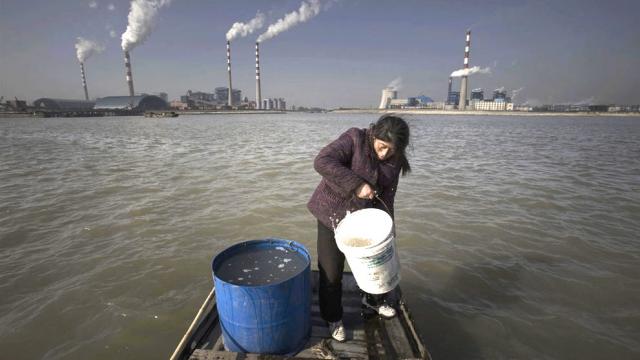
Drinking water for 117 million Americans will be protected under new rules shielding small streams, tributaries and wetlands from pollution and development, Barack Obama’s administration said Wednesday.
The White House said the rules would provide much-needed clarity for landowners, but some Republicans and farm groups said they go much too far. House Speaker John Boehner declared they would send "landowners, small businesses, farmers and manufacturers on the road to a regulatory and economic hell."
The rules, issued by the Environmental Protection Agency and the U.S. Army Corps of Engineers, are designed to clarify which smaller waterways fall under federal protection after two Supreme Court rulings left the reach of the Clean Water Act uncertain. EPA Administrator Gina McCarthy said the waters affected would be those with a "direct and significant" connection to larger bodies of water downstream that are already protected.
The Supreme Court decisions, in 2001 and 2006, left 60 percent of nation's streams and millions of acres of wetlands without clear federal protection, according to the EPA. The new rules say a tributary must show evidence of flowing water to be protected — like a bank or a high water mark. The regulations would kick in and force a permitting process only if a business or landowner took steps to pollute or destroy those waters.
Obama said in a statement that the rules will provide needed clarity for businesses and industries and "will ensure polluters who knowingly threaten our waters can be held accountable."
The rules face deep opposition from the Republican-led Congress and farmers concerned that every stream, ditch and puddle on their private land could now be subject to federal oversight. The House voted to block the regulations earlier this month, and a similar effort is underway in the Senate.
Republican James Inhofe of Oklahoma, the chairman of the Senate Environment and Public Works Committee, said his panel will consider a bill to force the EPA to withdraw and rewrite the rules this summer.
Boehner called the rules "a raw and tyrannical power grab."
Farm groups have said the rules could greatly expand the reach of the Clean Water Act and create confusion among officials in the field as to which bodies of water must be protected.
McCarthy has acknowledged the proposed rules issued last year were confusing and said the final rules were written to be clearer. She said the regulations don't create any new permitting requirements for agriculture and even add some exemptions for artificial lakes and ponds and water-filled depressions, among others.
These efforts were "to make clear our goal is to stay out of agriculture's way," she said in a blog on the EPA website.
"Major economic sectors, from manufacturing and energy production to agriculture, food service, tourism and recreation, depend on clean water to function and flourish," McCarthy said.
The American Farm Bureau Federation has led opposition to the rules, saying they could make business more difficult for farmers. The group said Wednesday that it would wait to review the final rules before responding.
The agriculture industry has been particularly concerned about the regulation of drainage ditches on farmland. The EPA and Army Corps said the only ditches that would be covered under the rule are those that look, act and function like a tributary and carry pollution downstream.
Since the rules were first proposed last year, the EPA has been working to clear up what it believes are misconceptions, putting to rest rumors that puddles in your backyard would be regulated, for example. Farming practices that are currently exempted from the Clean Water Act — plowing, seeding and minor drainage, among other things — will continue to be exempted.
In a call announcing the new rules, White House senior adviser Brian Deese said the only people who should oppose the rule "are polluters who threaten our clean water."
Environmentalists praised the rules, saying they would mean the smaller waters would regain federal protections that had been in doubt since the Supreme Court rulings.
Margie Alt, the executive director of Environment America, called the rules "the biggest victory for clean water in a decade."
3 WAYS TO SHOW YOUR SUPPORT
- Log in to post comments















